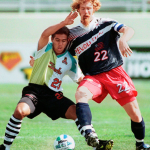
No one wears badges on the jerseys anymore
Chelsea will not be able to wear in the Premier the one for winning the World Cup for clubs while in Italy no one uses the ones created by the League for the best players anymore
February 18th, 2022
The most recent case belongs to the fresh winners of the FIFA Club World Cup, Tuchel's Chelsea, who along with the trophy received the honor of being able to pin on their game jersey the badge that testifies to their seasonal dominance. Only that such badge will not be able to be worn during Premier League matches, which does not allow mid-season kit changes and prefers not to play favorites to a rival competition. Liverpool, triumphant in the same competition two years ago, managed to put it on their shirts only on one occasion in the Premier League, while Chelsea seems intent on asking for a waiver for two games. A paltry reward for the best team in the world during this calendar year.
Chelsea could then use it in FIFA competitions and maybe in the FA Cup, if they get an exemption there too. We will see on February 22 if against Lille in the Champions League round of 16 the Blues will take the field with their golden medal in the center of the chest, but for now there is no official confirmation. A confusion that helps neither the teams nor the fans, who can now put the badge on their jersey by paying seven pounds in the official Chelsea store without knowing when they will ever see it in a match.
At the same time in Serie A no one is using the badges created by the league to identify the winners of the six seasonal awards, to be precise best goalkeeper, best defender, best midfielder, best striker, best youngster and MVP of the league. After Gianluigi Donnarumma, Cristian Romero, Romelu Lukaku and Cristiano Ronaldo left Serie A in the summer, Nicolò Barella only wore the badge intended for the best midfielder for the first game of the season, in which he also received his personal trophy. Dusan Vlahovic instead wore it on his Fiorentina jersey until he was sold to Juventus in January, and so far he has never used it on his new jersey.
But it is not the simple anecdote that makes us reflect on the real usefulness of these badges, but the systematic lack of coordination between federations and clubs that creates a chaos of overlapping regulations. In Serie A, Venezia could not have the symbols of their team on their chests because the design of the jerseys conflicted with the regulations of the league, while this year in the Champions League, Inter, Barcelona, Ajax and Galatasaray were forbidden to wear jerseys that in some way broke the codes of the voluminous and dusty European regulations.
The relationship between the regulations of the major national and international competitions and the creativity and merchandising strategies of the major clubs is increasingly compromised. And which, at the same time, prevents a basic coherence in the aesthetics of teams and tournaments, which are increasingly at war with each other. The story of Chelsea's badge testifies precisely how the conflicts between UEFA, FIFA and the Premier League prevent the proper celebration of a team's triumph, a condition that in the long run causes indifference towards certain types of recognition, as in the case of Serie A. In between the two contenders, then, there are always the fans, who cannot see their favorites on the field with the jerseys as they were designed, but can buy them at higher and higher prices in the stores outside the stadium.














